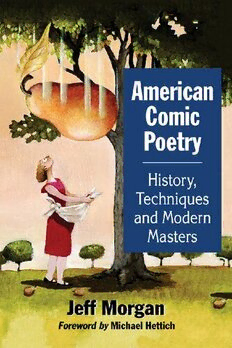
American Comic Poetry: History, Techniques and Modern Masters PDF
Preview American Comic Poetry: History, Techniques and Modern Masters
American Comic Poetry This page intentionally left blank American Comic Poetry History, Techniques and Modern Masters Jeff Morgan Foreword by Michael Hettich McFarland & Company, Inc., Publishers Jefferson, North Carolina LIBRARYOFCONGRESSCATALOGUING-IN-PUBLICATIONDATA Morgan, Jeff, 1959– American comic poetry : history, techniques and modern masters / Jeff Morgan ; foreword by Michael Hettich. p. cm. Includes bibliographical references and index. ISBN 978-0-7864-9984-7 (softcover : acid free paper) ♾ ISBN 978-1-4766-2346-7 (ebook) 1. Humorous poetry, American—History and criticism. I. Title. PS309.H85M67 2015 811'.0709—dc23 2015032110 BRITISHLIBRARYCATALOGUINGDATAAREAVAILABLE © 2015 Jeff Morgan. All rights reserved No part of this book may be reproduced or transmitted in any form or by any means, electronic or mechanical, including photocopying or recording, or by any information storage and retrieval system, without permission in writing from the publisher. Front cover image © 2015 nuvolanevicata/iStock/Thinkstock Printed in the United States of America McFarland & Company, Inc., Publishers Box 611, Jefferson, North Carolina 28640 www.mcfarlandpub.com To my wife, Dana Mary Lodge Acknowledgments I would like to thank the following people who have been supportive and inspirational: Marilyn Sam- uels, Roger Salomon, Miles Coon, Armand Singer, Laura Jo Henning, Jessica Hajek, Claudia Slate, Roberto Cadhile, Andrea Best, Gene Martel, Brit Sommers, Brent Hooker, John Daily, Alvaro Domene, David Miller, Dana Lodge, and Colin Morgan. Additionally, I want to thank the following organ- izations who have supported my work: Lynn Univer- sity, Florida College English Association, School of Visual Art in New York, and Common Ground. I would also like to acknowledge the following libraries and bookstores whose resources and assis- tance proved invaluable: Eugene M. and Christine E. Lynn University Library at Lynn University, Wimberly Library at Florida Atlantic University, Freiburger Library at Case Western Reserve University, Barnes and Noble Booksellers of Boynton Beach, and Murder on the Beach Mystery Bookstore of Delray Beach, Florida. Finally, I extend special acknowledgment to the administration and my faculty colleagues at Lynn Uni- versity in Boca Raton, Florida. vi Table of Contents Acknowledgments vi Foreword: The Best of All Medicines by Michael Hettich 1 Preface 5 Introduction 9 The Intellectual Approach 11 The Functional Approach 13 The Psychological Approach 14 1. A Brief History of American Comic Literature 17 Colonial and Pre- Colonial American Comic Literature 17 The Revolting Period 20 Early Post- Colonial Era 27 James Russell Lowell 30 The Flowering of the Comic Voice 44 Early Twentieth Century 52 Dorothy Parker 53 Ogden Nash 72 Late Twentieth Century 89 2. The Long and Short of It 92 Denise Duhamel, Comic Prose Poetry and the Three- Pronged Approach 92 Campbell McGrath’s “Ode to Bureacrats” and the Three- Pronged Approach 100 vii Table of Contents 3. Billy Collins and the Intellectual Approach 109 4. Thomas Lux and the Functional Approach 135 5. Tony Hoagland and the Psychological Approach 158 Conclusion 175 Bibliography 179 Index 183 viii Foreword: The Best of All Medicines Michael Hettich In my third year of college, when I was just beginning to focus seriously on learning to write poetry, I l ucked i nto the opportunity to study one- on-one with the Finnish American poet Anselm Hollo—a wild ride and a profound education in poetry and in the l ife-l ived-with- gusto. Hollo introduced me to a wide array of new ways (for me) of thinking about—and writing—poetry, including Charles Olson’s “pro- jective” verse, the work of the Objectivists—including Louis Zukof- sky—and even some of the poets who would later become central to the LANGUAGEmovement of the 1980s and beyond. While all of these poets were doing engaging and exciting work, they, like their High Modernist predecessors, were intellectually daunting, deadly serious, and generally o ff-p utting to anyone who wasn’t him/herself a critic or poet. My heart was more truly drawn to the associative, s urrealist- influenced poetries of the “Deep Image” writers and the poets of Latin America and Eastern Europe, so, though I was a bit in awe of Anselm himself, the poets he introduced me to never quite sang for me. Some- how I just didn’t feel smart enough for them. Then, one morning over small cups of very- strong coffee, Anselm introduced me to Frank O ’Hara’s poetry and to his “Personism: A Man- ifesto.” These were a revelation. I felt as though the sky had suddenly cleared to show a world of dazzling everyday pleasures in which cross- ing the street in traffic could be a thrill, and wolfing down a hot dog could be a gastronomical delight. In one fell swoop my idea of poetry— and indeed my whole attitude toward life and art—blossomed in its 1
